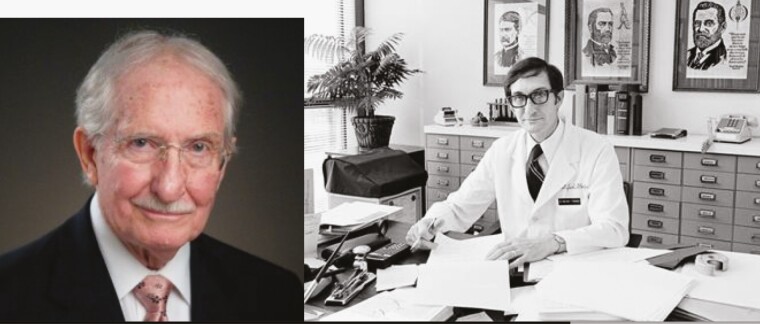The pediatric infectious disease community lost an icon and founding father of the Pediatric Infectious Diseases Society on August 8, 2021, with the death of Walter T. Hughes, MD, who passed away after a brief illness. He was 91. Dr Hughes was born and raised in Cleveland, Tennessee. After completing medical school at the University of Tennessee College of Medicine, he trained in pediatrics at Le Bonheur Children’s Hospital and University of Tennessee in Memphis. In 1957, he was commissioned as a captain in the US Army and assigned to the Walter Reed Army Institute of Research at Fort Detrick in Maryland. There, Dr Hughes kindled a love for the study of infectious diseases and how the combination of research and clinical care could advance progress. Following military service, he held academic positions at the University of Louisville School of Medicine, The Johns Hopkins University School of Medicine, University of Tennessee College of Medicine, and St. Jude Children’s Research Hospital. At Memphis-based St. Jude, Dr Hughes served as the first chair of the Department of Infectious Diseases and held the Arthur Ashe Chair of Excellence for Pediatric AIDS until 1995.
Dr Hughes made landmark contributions to the understanding, prevention, and treatment of Pneumocystis jirovecii pneumonia (PCP) in pediatric cancer patients and later in adults with HIV/AIDS. In 1977, the New England Journal of Medicine published his seminal research showing the drug combination trimethoprim and sulfamethoxazole (TMP-SMX) was highly effective against PCP. The TMP-SMZ prophylaxis regimen decreased the occurrence of PCP by an order of magnitude in high-risk immunosuppressed patients and remains the treatment and preventive therapy of first choice today. Dr Hughes is also credited with early investigation of dapsone and atovaquone as prophylaxis and treatment of PCP as well. This collective work led to his nomination for the Lasker Award in 2001.
Dr Hughes began the pediatric AIDS clinical research program at St. Jude in 1987, a program that continues to thrive today. He was a prolific writer with over 500 publications. Writing was such an important part of his life that in retirement, he authored seven historical fiction novels and nonfiction books, including one about the yellow fever epidemic that devastated Memphis in the late 1800s. Dr Hughes also frequently shared his musing via Facebook, posting a series called, “Poor Walter’s Almanac and Diary,” in which he offered humorous and insightful thoughts on current events, history, science, medicine, and life around him. Although his professional accomplishments are many, Dr Hughes will be remembered most as a kind gentleman who was devoted to his wife, Jeannette, and their three children, five grandchildren, and one great-grandchild. He was a respected teacher, mentor, and researcher who, through charming stories and wit, continued to share a wealth of clinical experience with St. Jude trainees during his tenure as an emeritus professor. Dr Hughes may have been soft-spoken, but those around him knew to listen because what he had to say was reliably important and valued by colleagues. He will be greatly missed.



